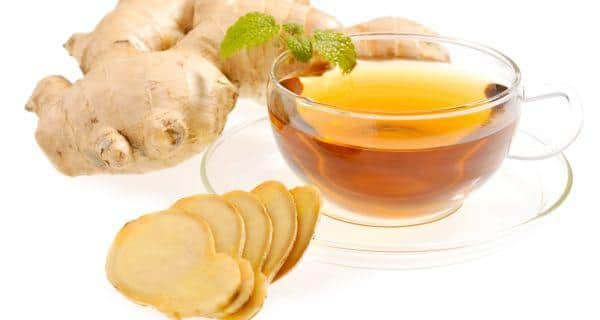Bhavyajyoti Chilukoti Feb 16, 2015 at 05:09 pm
Ginger tea is well-known for its powerful medicinal benefits that range from fighting nausea to reducing menstrual pain. A sip of this healthy drink in the morning not only refreshes you but also provides a whole range of antibacterial, antioxidant and anti-inflammatory compounds. Though there are numerous reasons to include ginger in your diet, here are 10 ways ginger tea can work wonders for your health!

#1 Acts as natural aid for migraine and tension headache
Ginger contains anti-inflammatory compounds that play a key role in combating various symptoms of migraine and headache. These compounds inhibit the synthesis of prostaglandins that cause inflammation and pain thereby relieving a headache and its associated symptoms namely nausea and vomiting. So the next time you experience a migraine attack or headache, sip a cup of warm ginger tea.
#2 Treats cough, cold and sore throat
By promoting salivation and mucus secretion, ginger tea provides quick relief from cough symptoms. In addition to preventing airway contraction, ginger has antihistamine property that helps in treating allergies thereby aiding in quick recovery from cough and cold. For effective results, drink this tea twice a day. Here are 5 natural remedies for cough and cold that really work!
#3 Aids in the treatment of kidney infections
Ginger contains a volatile oil that is made of gingerol, which has a strong antibiotic action. Coupled with anti-inflammatory and anti-microbial properties, this spice provides effective results in relieving kidney infections. Drink this tea in the morning and in the evening time along with taking medications as prescribed by your doctor for better results.
#4 Reduces menstrual pain
Gingerols present in ginger inhibits the production of these hormones and provides relief from the painful menstrual cramps. Ginger also reduces pitta in the body which is found to cause cramps during periods, thereby relieving menstrual pain. Consume a cup of ginger tea daily (2 – 3 days before your periods) to get rid of delayed menstruation and menstrual pain. Here are 10 natural remedies to reduce pain during your menstrual periods.
#5 Relieves post nasal drip
As ginger tea contains mostly water, it causes thinning of mucus thereby acting as an effective natural remedy to control postnasal drip. This is mainly due to the presence of anti-inflammatory compounds and anti-bacterial action of ginger. All you need to do to get rid of this condition is to drink this tea at frequent intervals.
#6 Stimulates the digestive system
Ginger is packed with antioxidants and that play a key role in the absorption and assimilation of dietary nutrients thereby aiding in digestion. It also helps break down the proteins in your food and protects the stomach against ulcers by promoting mucus secretion. Hence, if you are suffering from indigestion or acidity drink a cup of ginger tea to attain instant relief. Do you suffer from digestion problem? Try these yoga poses to improve your digestive system.
#7 Prevents various types of cancer
A recent research study has shown that ginger posses the ability to induce programmed cell death (apoptosis) and also suppress the activity of protein molecules responsible for cancer. Although ginger can prevent various types of cancer, it is found to be effective against ovarian cancer. To reap the anti-cancer properties of ginger, make it a habit to drink ginger tea every morning.
#8 Helps to deal with arthritic pain
The anti-inflammatory compounds present in ginger root reduce pain associated with inflammatory conditions like arthritis. Apart from reducing pain and inflammation, drinking a cup of ginger tea relieves muscle pain.
#9 Acts as an appetizer
Are you suffering from a poor appetite? Well, cup of ginger tea when consumed in the morning or mid-afternoon might do the trick. Ginger stimulates the production of digestive juices and in turn, increases your appetite. It acts as an effective home remedy to improve digestive power along with cleansing toxins from the stomach. Here are home remedies to improve your appetite and eat more.
#10 Improves blood circulation
Ginger is increasingly gaining recognition as a herb that promotes heart health. Studies have shown that ginger is capable of preventing formation of clots, improving blood circulation, lowering LDL cholesterol levels and also prevents formation of a blood clot.
# 11 Moisturises the skin
The presence of potent antioxidants and anti-inflammatory compounds in ginger helps in flushing out the harmful toxins from the body and thus, maintain your skin health. Apart from this, drinking ginger tea hydrates the skin thereby helping in restoring the moisture and thus, aid in natural glow. Read about 5 skincare secrets by dermatologists for radiant skin.
Ginger tea – how to prepare it at home?
- Take a medium piece of ginger, wash and peel it.
- Now, grate ginger or chop it into few pieces.
- Add these ginger pieces to a cup of boiling water and steep it for around 10 to 15 minutes.
- Allow this mixture to cool a little, strain and drink.
- You can also add honey, tulsi leaves and lime juice (it’s optional).
Image Source: Getty images
References:
- Habib, S. H. M., Makpol, S., Hamid, N. A. A., Das, S., Ngah, W. Z. W., & Yusof, Y. A. M. (2008). Ginger Extract (Zingiber Officinale) has Anti-Cancer and Anti-Inflammatory Effects on Ethionine-Induced Hepatoma Rats. Clinics (Sao Paulo, Brazil), 63(6), 807–813. doi:10.1590/S1807-59322008000600017
- Zeng GF, Zhang ZY, Lu L, Xiao DQ, Zong SH, He JM. Protective effects of ginger root extract on Alzheimer disease-induced behavioral dysfunction in rats. Rejuvenation Res. 2013 Apr;16(2):124-33. doi: 10.1089/rej.2012.1389. PubMed PMID:Vutyavanich T, Kraisarin T, Ruangsri R. Ginger for nausea and vomiting
- Vutyavanich T, Kraisarin T, Ruangsri R. Ginger for nausea and vomiting inpregnancy: randomized, double-masked, placebo-controlled trial. Obstet Gynecol.2001 Apr;97(4):577-82. PubMed PMID: 11275030.
- Srivastava KC, Mustafa T. Ginger (Zingiber officinale) in rheumatism andmusculoskeletal disorders. Med Hypotheses. 1992 Dec;39(4):342-8. PubMed PMID:1494322.
